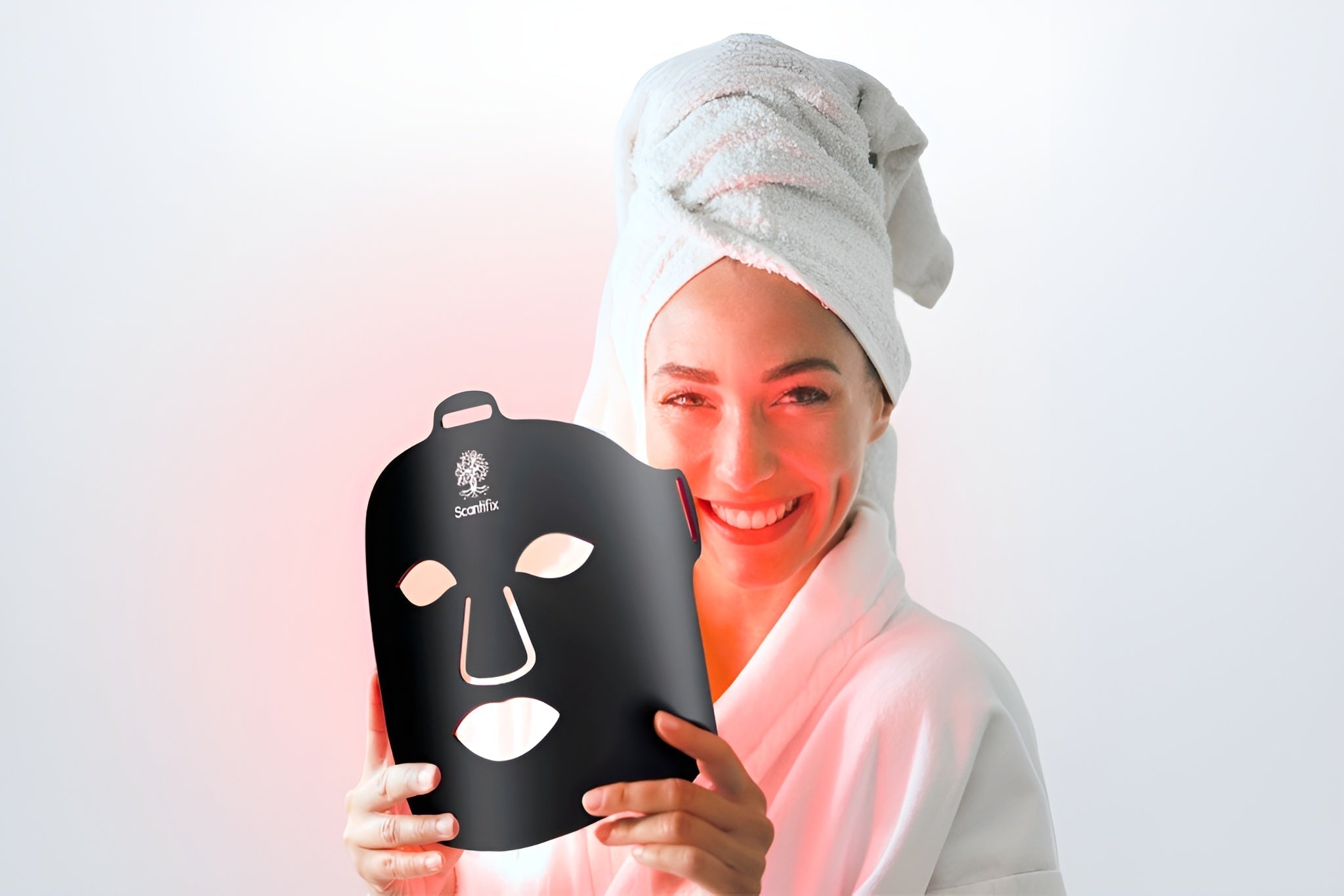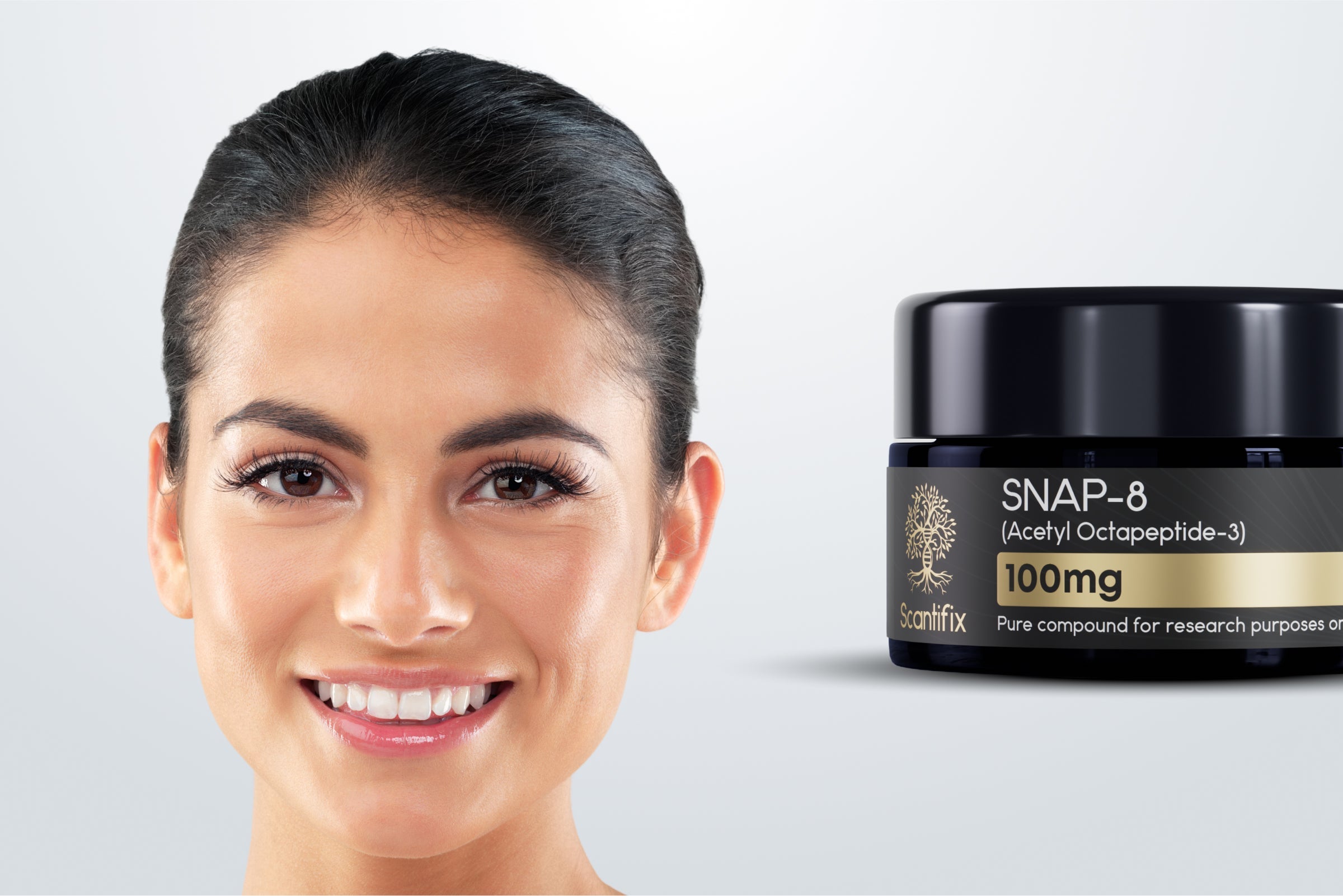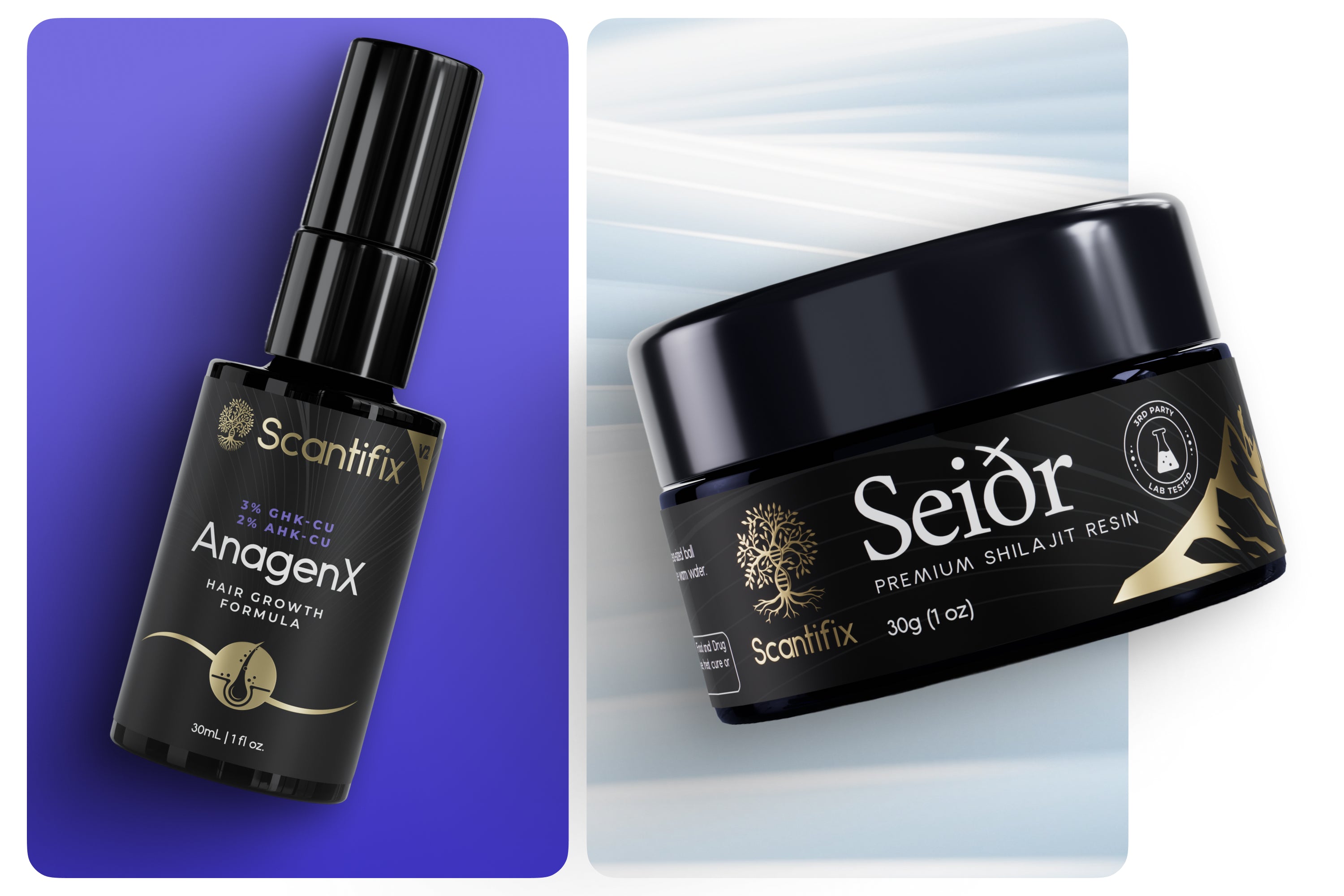In the grand tapestry of life, collagen stands as a fundamental thread, weaving its way not only through our skin but also through our bones and connective tissues. Over time, as scientific exploration has progressed, so too has our understanding and utilization of collagen, from early discoveries to today’s advanced skincare formulations.
But is collagen in skincare really effective? And how can we achieve the best collagen boost? Let’s embark on a journey to unravel the mysteries of collagen - its functions, impact on skin & hair, and what works best for collagen stimulation.
What is collagen?
Behind every well-built structure lies a hidden support system. Just as steel beams reinforce skyscrapers, collagen serves as the body’s internal scaffolding, holding everything together. Chemically speaking, collagen is a protein composed of amino acids, primarily glycine, proline, and hydroxyproline. These amino acids assemble into a unique triple-helix structure, granting collagen its incredible tensile strength and flexibility.
Historically, collagen’s significance was first recognized in the early 20th century when scientists began to understand its role in connective tissues. Over time, research has unveiled its multifaceted functions, leading to its incorporation into various health and beauty products.
Many people ask: What is collagen in skincare? Does collagen in skincare work? The answer lies in how it is formulated and absorbed by the skin. Certain formulations, particularly those with peptides and hydrolyzed collagen, penetrate deeper into the skin and deliver truly transformative results.
What does collagen do?
Collagen is maintaining the integrity of our skin, bones, and connective tissues. In the skin, it provides elasticity and firmness, warding off wrinkles and sagging. In the scalp, it plays a crucial role in supporting hair follicles by providing structural strength and promoting a healthy environment for hair growth. Having enough collagen can lead to thicker, stronger hair while also helping to reduce brittleness and thinning.
However, collagen loss with age is inevitable, and collagen levels naturally decline over time. This leads many to wonder: at what age do you stop producing collagen? While production never completely stops, expect a decline of about 1% per year starting around age 30.
Beyond aesthetics, collagen is vital for joint health, cushioning our joints and enabling smooth movement. A decline in collagen can result in joint discomfort and stiffness, often associated with conditions like osteoarthritis.
Collagen and aging
The body’s collagen synthesis typically peaks during adolescence and early adulthood, supporting growth, skin elasticity, and overall tissue strength. However, starting in our mid-20s, collagen production begins to decrease, with a more pronounced reduction over time. Environmental factors such as UV exposure, smoking, and poor nutrition contribute to collagen degradation, leading to increased skin laxity and the formation of wrinkles.
Some seek to support collagen levels and maintain skin health through dietary choices, such as consuming collagen-rich foods like bone broth, chicken skin, and fish. Others turn to supplements and topical treatments to help boost collagen and slow down visible signs of aging.
Collagen ingredients in skincare and hair care
The beauty industry has harnessed the power of collagen, developing products designed to replenish and stimulate its production. These formulations often contain specific ingredients that signal the skin to produce more collagen. But do they work? Studies suggest that peptides and hydrolysed collagen are more effective than collagen molecules themselves, which are often too large to penetrate the skin.
Rapid collagen infusion
Rapid collagen what? Welcome to a cutting-edge approach in skincare. This technique delivers collagen-boosting ingredients deep into the skin, helping to stimulate natural collagen synthesis and replenish lost collagen in the face.
This method often involves advanced formulations that effectively penetrate the skin barrier, ensuring that active ingredients reach the dermal layers where collagen production occurs. By stimulating fibroblast activity, rapid collagen infusion enhances skin elasticity, reduces wrinkles, and restores a youthful appearance.
In the realm of advanced skincare, the GHK-Cu copper peptide has gained prominence for its ability to promote collagen production and support skin regeneration.
Read more about the skin and hair benefits of GHK-Cu on our blog.
Best collagen face treatment
When it comes to selecting collagen-enhancing skincare, several categories stand out:
-
Collagen anti-aging creams: Formulated with active ingredients like retinoids and peptides, these creams help reduce wrinkles, improve skin texture, and promote collagen synthesis.
-
Collagen face masks: Deliver a concentrated dose of collagen anti-aging ingredients, offering immediate hydration and plumping effects.
-
Collagen face oils: Rich in essential fatty acids, these oils nourish the skin, strengthen the skin barrier, and enhance elasticity.
-
Anti-aging collagen serums: Lightweight and fast-absorbing, these serums penetrate deeply to deliver active ingredients that boost collagen production.
-
Red light therapy (RLT): A non-invasive treatment that uses low-wavelength red light to stimulate collagen production, improve elasticity, and reduce wrinkles, resulting in firmer, more youthful skin.
Reviva Lux
For those looking to restore lost collagen in the face, the Reviva Lux Red Light Therapy Mask by Scantifix is an excellent choice. This collagen-boosting facial treatment utilizes red light therapy to penetrate deep into the skin, activating fibroblasts - the cells responsible for collagen production. With regular use, it can enhance skin firmness, improve elasticity, and reduce the visible appearance of fine lines and wrinkles.
Best collagen hair treatment
Hair health is intrinsically linked to collagen, as it provides the amino acids necessary for keratin production - the protein that makes up hair strands. Collagen hair treatment options focus on strengthening the hair shaft, reducing breakage, and promoting overall hair vitality.
-
Collagen shampoos & conditioners: Collagen-enriched shampoos and conditioners may help nourish the scalp, strengthen hair fibers, and add volume. By coating the hair shaft with protective proteins, these formulas help reduce breakage, improve hydration, and support overall hair health.
-
Collagen-infused hair masks: These deep-conditioning treatments are designed to restore moisture, repair damage, and fortify hair strands. Collagen-infused hair masks work by penetrating the hair cuticle to improve elasticity and reduce brittleness, making hair stronger, smoother, and more resilient.
-
Red light therapy for hair growth: Just as red light therapy stimulates collagen production in the skin, it also benefits the scalp by improving circulation and enhancing follicle activity. By boosting blood flow and increasing cellular energy (ATP production), RLT revitalizes hair follicles, encouraging thicker, healthier hair growth. Regular use of RLT can help combat hair thinning, promote stronger roots, and support overall scalp health.
Dome Beamer
The Dome Beamer by Scantifix is an innovative helmet that uses red light therapy as a collagen treatment for hair at home. By enhancing blood circulation and delivering red light energy to hair follicles, it helps stimulate collagen production, strengthen hair strands, and improve overall hair density. This non-invasive treatment offers a convenient solution for those seeking to rejuvenate their hair without salon visits.
Anti-aging collagen supplements
While topical applications play a significant role, supporting collagen from within is equally important. Collagen supplements, available in various forms such as powders, capsules, and liquids, provide the body with the building blocks needed for collagen synthesis.
A common question arises: What age should you start taking collagen? While individual needs vary, many experts suggest beginning supplementation in your mid-20s to early 30s, aligning with the natural decline in collagen production.
Microneedling and collagen production
Another way to boost collagen is through microneedling, also known as collagen induction therapy. This minimally invasive treatment enhances the skin’s natural collagen production by creating micro-injuries with tiny needles. These controlled injuries trigger the body’s wound-healing response, stimulating fibroblasts to produce new collagen and elastin.
Read more about this topic on our blog.
What the data show
Alright, let’s cut through the noise and get to what really matters. Science! Here’s a breakdown of what the data says about collagen production, skin elasticity, and the effectiveness of peptides, red light therapy, topical treatments, and supplements.
-
Peptides and collagen production: A 2018 study found that applying GHK-Cu peptides to human skin fibroblasts increased collagen synthesis by 70% over 12 days. This suggests that copper peptides can play a significant role in promoting skin regeneration and elasticity.
-
RLT and increased collagen synthesis: A 2019 study found that consistent exposure to low-level red and near-infrared light increased collagen production by 31%, along with a 24% rise in elastin levels and a 28% boost in hyaluronic acid.
-
Topical collagen tripeptide and skin aging: A 2022 study examined the effects of a topical collagen tripeptide (CTP) formulation applied daily for four weeks. Results showed significant improvements in skin wrinkles, elasticity, and density, along with a reduction in the accumulation of advanced glycation end products (AGEs) in the skin.
- Collagen supplements and skin rejuvenation: A 2023 meta-analysis reviewed 19 studies involving 1,125 participants. The findings showed that daily collagen supplementation ranging from 2.5 to 10 grams over 8 to 12 weeks led to notable enhancements in skin hydration, firmness, and elasticity.
Final thoughts
Collagen is a critical component of anti-aging skincare and hair care. By integrating the right skincare products, treatments, and supplements, you can effectively support collagen stimulation and maintain youthful skin and hair.
For those ready to take a proactive, science-backed approach, explore the range of collagen production boosting solutions at Scantifix. From red light therapy devices to collagen-boosting peptides and microneedling beauty tools - each designed to work in harmony with your body’s natural processes, helping you age with grace, confidence, and radiance.
Discover the Scantifix difference

|
 |
 |
 |









Leave a comment
All comments are moderated before being published.
This site is protected by hCaptcha and the hCaptcha Privacy Policy and Terms of Service apply.